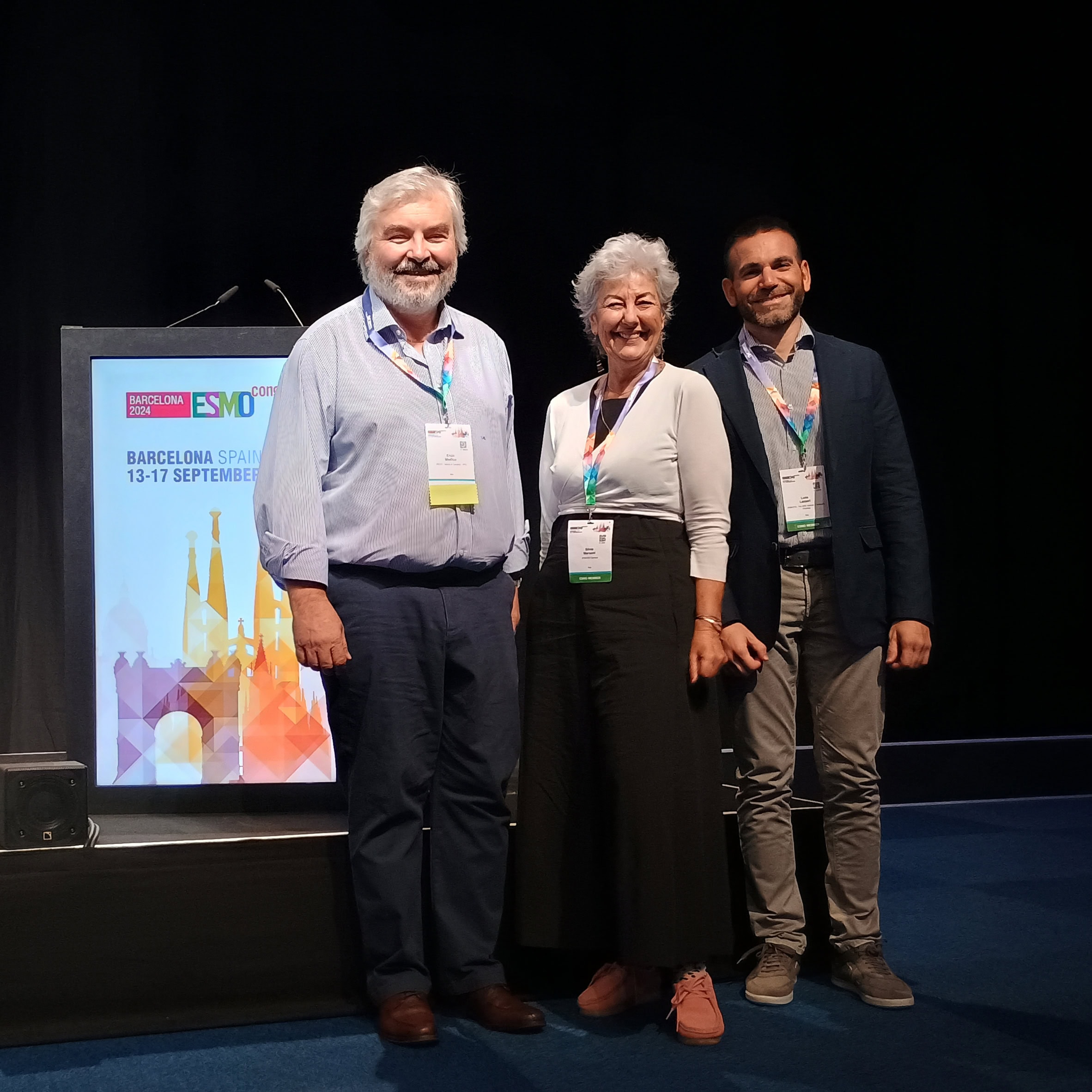Barcelona, 14/09/24
On September 14, major advancements in understanding the biology of colon cancer in patients from the PEGASUS study were presented at the European Society for Medical Oncology (ESMO 2024) congress in Barcelona. Researchers discovered that liquid biopsy, a technology also used in the SAGITTARIUS study which allows the detection and analysis of minimal traces of cancer in the blood, may provide a deeper understanding of the biological characteristics of colon tumours with micrometastases, making them easier to treat.
This research project is the result of the work of an international group of more than 20 researchers*. “The list is long, but even if only one of us takes the podium, the recognition must be shared with all, because holistic studies like this are only possible through the collaboration of various specialists and institutions,” underlined Alberto Bardelli, Scientific Director of IFOM, and Salvatore Siena, Director of the Department of Hematology, Oncology, and Molecular Medicine and the Niguarda Cancer Center at the Grande Ospedale Metropolitano Niguarda (Milan) and Professor and Director of the Medical Oncology Specialty School at the University of Milan.
The relevance of the PEGASUS study results
Currently, all individuals with colon cancer who undergo partial colon removal must then receive chemotherapy, a treatment that seriously impacts the patient’s quality of life due to its side effects. The PEGASUS study had already demonstrated that liquid biopsy allows for the classification of patients into two categories - those with “born to be bad” tumours, where micrometastases remain after surgery and thus require additional treatments, and those with “born to be good” tumours, which are non-micrometastatic and may not need further therapy. These findings were first presented at the ESMO 2023 Congress.
The PEGASUS study also includes a translational component, which investigates the. This helps decode the tumours features that determine the varying progression of the disease and response to therapy in seemingly identical patients.
The first translational results of the PEGASUS study
The results of the study presented at this year’s congress show that liquid biopsy is not only useful in guiding treatment, but it also provides insights into the characteristics of micrometastatic tumours.
“Using transcriptomics - RNAs - we identified significant differences between the ‘born to be bad’ and ‘born to be good’ tumours,” commented Enzo Medico, Director of the Oncogenomics Laboratory at the Candiolo Cancer Institute IRCCS and professor at the University of Turin, who presented the data at the congress. “The study results showed that these ‘signatures’ help to understand what the patient’s prognosis will be from the beginning, before therapy, with 70% accuracy,” explained Sara Lonardi, head of Medical Oncology Unit 1 at the Veneto Institute of Oncology IRCCS and Principal Investigator of PEGASUS.
“This is just the beginning,” added Silvia Marsoni, Head of the Unit of Precision Oncology at IFOM and Scientific Coordinator of both PEGASUS and SAGITTARIUS projects. “In a few months we may be able to completely differentiate these two biological entities. In fact, besides RNA, we are also investigating many other characteristics in these samples: from the genome (the set of genes), to proteomics (the set of proteins derived from these genes), and more. Only by combining all this information will we be able to decipher the molecular complexity of micrometastatic tumours, helping researchers identify hitherto unknown vulnerabilities in the disease, potentially leading to the development of new therapies,” she concluded.
PEGASUS is where the SAGITTARIUS project, funded by the Horizon Europe programme, laid its foundations. Building on PEGASUS experience, SAGITTARIUS will assess the use of liquid biopsy to detect signs of colon cancer in patients after surgery, guide patients’ post-surgical treatment and personalize the therapeutic approach. To find out more about the project:
- Visit https://sagittarius-horizon.eu/ and download infographics, fact sheets and other materials in the Resources section;
- Important news will also be published on the SAGITTARIUS website, in the newsletter and on social profiles: LinkedIn, Facebook, X, Instagram, YouTube.
- To arrange interviews, contact SAGITTARIUS’ media relations and communication officers at info@sagittarius-horizon.eu
* Enzo Medico (Istituto di Candiolo IRCCS and Università degli Studi di Torino), Francesca Meteora Buffa (Università Bocconi, Milano), Claudio Isella (Istituto di Candiolo IRCCS e Università degli Studi di Torino), Caterina Marchiò (Istituto di Candiolo IRCCS and Università degli Studi di Torino), Geri Skenderi (Università Bocconi, Milano), Luca Lazzari (IFOM ETS, The AIRC Institute of Molecular Oncology, Milano), Michele Prisciandaro (Fondazione IRCCS Istituto Nazionale dei Tumori, Milano), Sara Lonardi (Istituto Oncologico Veneto IRCCS), Noelia Tarazona Llavero (Hospital Clínico Universitario de Valencia), Clara Montagut Viladot (Hospital del Mar, Spain), Andrea Sartore-Bianchi (Centro Oncologico Niguarda and Università degli Studi di Milano), Maria Giulia Zampino (Istituto Europeo di Oncologia, Milano), Maria Elena Élez Fernandez (Vall d'Hebron University Hospital, Barcellona), Cristina Santos Vivas (L'Hospitalet de Llobregat, Spain), Mario Mandalà (Università degli Studi di Perugia), Stefano Tamberi (Ospedale Santa Maria delle Croci, Ravenna), Alexandre Calon (Hospital del Mar, Barcellona), Andres Cervantes (Hospital Clínico Universitario de Valencia), Salvatore Siena (Niguarda Cancer Center e Fondazione Oncologia Niguarda, Milano), Alberto Bardelli (Dipartimento di Oncologia, Università degli Studi di Torino and IFOM ETS, The AIRC Institute of Molecular Oncology, Milano) and Silvia Marsoni (IFOM ETS, The AIRC Institute of Molecular Oncology, Milano).

